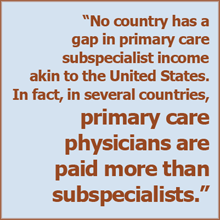Synopsis
The experiences of other industrialized countries show that ensuring access to primary care—one of the goals of U.S. health reform—can provide the groundwork for efforts to improve overall care and population health while also controlling costs.
 The Issue
The Issue
Over the next few years, provisions of the Affordable Care Act seek to strengthen the U.S. primary care system by expanding the workforce, providing physician practices with technological and other support, and increasing provider payment, among other approaches. In April 2011, The Commonwealth Fund and the Agency for Healthcare Research and Quality (AHRQ) supported a conference of frontline clinicians, researchers, and policymakers from six nations—Australia, Canada, Denmark, the Netherlands, New Zealand, and the United Kingdom—that have taken varying approaches to improving primary care. In a special issue of the Journal of the American Board of Family Medicine, Robert L. Phillips, Jr., M.D., M.S.P.H., director of the American Academy of Family Physicians' Robert Graham Center, summarized lessons discussed at the conference.
Key Findings
- Most developed nations embed efforts to improve population health within their primary care systems. For example, the U.K. holds practices accountable for the health of a designated patient population through regional consortia of general practitioners that have responsibility for commissioning services and contracting with the National Health Service.
- The six countries are experimenting with new delivery models, including multidisciplinary care teams (Canada); "super clinics" to provide a broad array of services in underserved areas (Australia); and practice consortia to manage chronic conditions and provide after-hours care (Netherlands and Denmark).
- The Affordable Care Act envisions the Primary Care Extension Program to support practices in their efforts to coordinate and improve care. Similarly, in Australia, the Practice Health Atlas helps clinicians create patient registries, while in New Zealand an academic detailing process provides information about best practices, prescribing patterns, and patient care patterns.
- In five of the six countries, with Canada the exception, nearly all primary care practices use health information technology. The Dutch electronic medical record system uses the International Classification of Primary Care for recording diagnoses and treatments, which facilitates data exchange between practices and hospitals and enables the development of decision-support tools.
- Most of the nations currently have, or are moving toward, primary care payment models that blend capitation with fees for services or other incentives. Canadians note that the success of blended payment is tied to population health management, which requires external support.
- None of the countries has as wide a gap as the U.S. does between primary care provider and subspecialist reimbursement levels. In fact, in some countries, primary care physicians earn more than subspecialists
Addressing the Problem
The Affordable Care Act should help ensure that nearly all Americans have access to care—the first step in efforts to transform primary care. Evidence from other nations demonstrates that a strong primary care strategy can help nations improve care as well as population health while controlling costs.
About the Study
Dr. Phillips’s commentary draws on six articles on international efforts to improve primary care published in a special issue of the Journal of the American Board of Family Medicine. The articles were written by members of the delegations that attended the April 2011 conference funded by AHRQ and The Commonwealth Fund.
The Bottom Line
As the U.S. reforms its health care system, it can learn from other advanced nations that have more robust primary care systems, place a greater focus on population health, and enjoy better health outcomes.